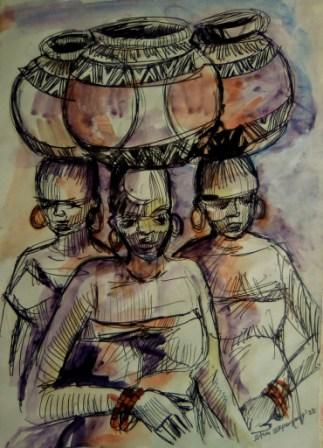L'eau, agent de purification et substance vitale: Les relations des femmes avec l'eau dans les provinces du sud du Nigéria

Publié 2025-03-30
Mots-clés
- rituels de l'eau,
- Peuple Igbo,
- sociétés nigérianes traditionnelles,
- rôles des femmes
© Etim Ekpenyong Mfon (Author) 2025

Cette œuvre est sous licence Creative Commons Attribution - Pas d'Utilisation Commerciale - Pas de Modification 4.0 International.
Comment citer
Résumé
Dans les sociétés nigérianes traditionnelles, les femmes et les filles assument principalement la responsabilité d'aller chercher de l'eau, ce qui reflète leur rôle nourricier au sein des familles et des communautés. De nombreuses cultures nigérianes associent l'eau à la guérison, à la purification, à la fertilité et à la vie, impliquant souvent les femmes dans des rituels favorisant le bien-être et rétablissant l'équilibre. Cet article explore les croyances sur les femmes et l’eau parmi les peuples Yoruba, Edo et Igbo, trois groupes ethniques du Nigéria. Des entretiens avec des femmes d'âges et de statuts sociaux variés ont fourni diverses perspectives sur ces pratiques culturelles. Les principales conclusions révèlent le rôle important que jouent les femmes dans des festivals tels que le festival Osun à Osogbo, le festival Igue à Benin City, les rites de passage Ikwe Ezi des communautés Mgbidi et le festival Yemoja à Ibadan, où les rituels sont centrés sur les rivières et où les femmes sont des participantes essentielles. L'étude souligne le rôle central des femmes dans les activités et les rituels liés à l'eau, soulignant la nécessité de politiques qui répondent aux défis uniques auxquels les femmes sont confrontées pour accéder à l'eau et à l'assainissement.
Références
- Adebayo, K. O. (2021). Local and Transnational Identity, Positionality and Knowledge Production: Reflections on Ethnographic Research in Africa and Asia" Retrieved March 12, 2025 from https://journals.sagepub.com/doi/.
- Adebayo, O. (2021). Yoruba African Women and Patriarchal Excesses in the Context of Globalization and Sustainable Development Goals. Asian Women, 37(3), 95–120. https://doi.org/10.14431/aw.2021.9.37.3.95
- Adeyinka, O. (2023). Arugbá : Unveiling The Profound Significance Of Òşun-Òşogbo Festival Retrieved: http://www.ancestrals.com.ng
- Agbaje, O. (2021). Water Symbolism in Yorùbá Folklore and Culture1. Retrieved March 10, 2025 from https:// www.researchgate.net/publication/357592748_Water_Symbolism_...
- Ahmed, S. (2021). "Water: Women and men have differential roles, rights and responsibilities." Retrieved August 11, 2023, from https://ideas4development.org/en/water.
- Akanni, A. & Uche C. (2014). Demographic dynamics and development in Nigeria. Vol. 27 No. 2 (2014): Supplement on Nigeria Population and Development Issues Retrieved: March 12, 2025 from https://aps.journals.ac.za/pub/article/view/471
- Akinjobin, A. I. (1980). The Yoruba and their neighbours, 1700-1890. Cambridge University Press.
- Akinwunmi, Rachael (2023). Interview with Researcher, Badagry, Lagos State.
- Akomolafe, C. (2023). Interview with Researcher, Lusada, Ogun State. 2:45 pm
- Arugba Osun Osogbo Festival (2023). Retrieved August 11, 2023 from: https://www.facebook.com/media/set/?set=a.
- Bayyinah, J. (2023). Osun, the Yoruba Deity. Retrieved September 11, 2023, from https://www.britannica.com/topic/Oshun
- Bradbury, Robert Elwyn. (1973). Benin studies. Oxford University Press.
- Bruce, A. (2014). The Sacred Journey. Retrieved June 14, 2023, from https://www.pbs.org/wgbh/sacredjourneys/content/osun-osogbo/
- Chukwu, A. (2018). Sacred waters: Spiritual significance and rituals in Igbo cosmology. Enugu: Igbo Studies Press.
- Chukwu, J. C. (2015). Role of Women in the Growth of the Traditional Igbo Economy. Journal of Culture, Society and Development, 10, 38-46. Retrieved March 12, 2025 from https://www.iiste.org/Journals/index.php/JCSD.
- Chuku, G. (2018). Igbo historiography: Part II. Retrieved March 12, 2025, from https://compass.onlinelibrary.wiley.com/doi/.
- CIA Worldbook. Nigeria Factsheet. Retrieved 5 March 2025, from https://www.cia.gov/the-world-factbook/countries/nigeria/factsheets/.
- Clara, Chief Mrs. Akomolafe (2023). Interview with Researcher, Ikorodu, Lagos State, 11:20 am.
- Concernusa. (2021). Why water is a women's issue. Retrieved August 30, 2023, from https://concernusa.org/news/water-is-a-womens-issue.
- Egharevba, A. (2025). Interview with researcher. Benin City, Edo State. 11:45 am
- Ekechi, F. K. (1971). Missionary enterprise and rivalry in Igboland, 1857–1914. London: Frank Cass and Company Ltd.
- Ekechi, F. K. (1972). Traditional Igbo rituals and their socio-cultural importance. Onitsha: Heritage Publishers.
- Eze, C. (2023). Oya, the Yoruba Rain Goddess. Retrieved September 11, 2023, from https://guardian.ng/life/oya-the-yoruba-rain-goddess
- Ezekiel, Amaka (2023). Interview with Researcher, Ojo, Lagos State. 2:45 pm
- Fela, K. (1975). Water No Get Enemy (Water Has No Enemy. Retrieved June 3, 2023, from https://genius.com/Fela-kuti-water-no-get-enemy-lyrics
- Femi, A. (2020). Dance, Water and Prayers: Celebrating The Goddess Yemoja. Retrieved July 16, 2023, from https://www.aljazeera.com/features/2020/12/6/dance-water-and-prayers-celebrating.
- Foreign Affairs Nigeria. (n.d.). Nigeria's culture. Retrieved December 26, 2024, from https://foreignaffairs.gov.ng/nigeria/nigeria-culture
- Idowu, Bankole (2023). The Arugba. Interview with Researcher, Yaba, Lagos state. 10 am
- Momodu, T (2024). Traditional festivals in Akoko-Edo: Celebrating womanhood during Uzoro festival. Retrieved: https://www.thehopenewspaper.com/traditional-festivals-in-akoko-edo-celebrating-womanhood-during-uzoro-festival/
- Nwa'Nsukka, A. (2022). Image of Ada igbo fetching water: Retrieved: https://commons.wikimedia.org/wiki/File:Ada_igbo_fetching_water.jpg
- Nwosu, A. (2019). Cultural Practices of the Igbo People. Heritage Books, pp. 67-89.
- Nwosu, I. (2019). Igbo culture and traditions: Understanding the customs of Nigeria's southeast. Heritage Publishers.
- Agbaje, O. (2021). Water Symbolism in Yorùbá Folklore and Culture1. Retrieved March 10, 2025 from https:// www.researchgate.net/publication/357592748_Water_Symbolism_...
- Onochie, U. (2024). Interview with Researcher, Asaba, Delta State. 11:30 am
- Onwuejeogwu, M. Angelu. (1981). An Igbo Civilization: Nri Kingdom & Hegemony. London: Ethnographica, pp. 45-78.
- Seligmann, L. & Estes, B. (2019). Innovations in Ethnographic Methods. Retrieved March 10, 2025 from: https://www.researchgate.net/publication/335718882_Innovations_in_Ethnographic_Methods
- Smith, J. (2020). Idemili: The river goddess and her role in Igbo mythology. Abuja: African Mythology Publications.
- Smith, J. (2020). The Demographics of Nigeria. New Press, pp. 215-230.
- Smith, T. A. (2020). Water and its impact on women in southeastern Nigeria: A comparative study. African Journal of Environmental Studies, 18(4), 120-135.
- Twinckl. (2023). Osun Festival. Retrieved July 3, 2023, from https://www.twinkl.com.ng/event/osun-festival-nigeria-2023
- Massimo, A. (2018). Ethnography and the digital fields of social media. Retrieved March 11, 2025, from https://www.researchgate.net/publication/324769808_Ethnography_and_the_digital.
- WHO. (2023). Women and girls bear brunt of water and sanitation crisis – new UNICEF-WHO report. Retrieved July 12, 2023, from: https://www.who.int/news/item/06-07-2023-women-and-girls-bear-brunt-of-water-and-sanitation-crisis---new-unicef-who-report
- World Atlas. (n.d.). Largest ethnic groups in Nigeria. Retrieved December 26, 2024, from https://www.worldatlas.com/articles/largest-ethnic-groups-in-nigeria.html
- Worldometer. (n.d.). Nigeria population. Retrieved December 26, 2024, from https://www.worldometers.info/world-population/nigeria-population

